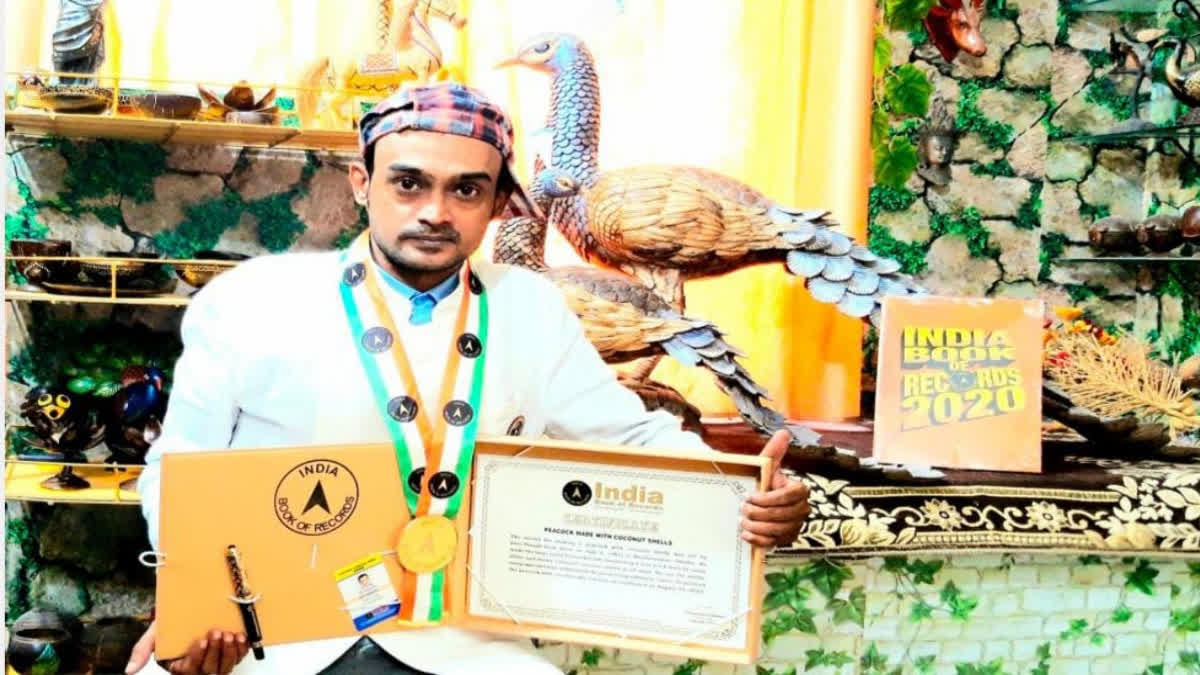By Bikash Kumar Das
Bhubaneswar : One day, while passing by the Lingaraj Temple in Bhubaneswar, Deviprasad Dash noticed piles of discarded coconut shells dumped at different places. This was a regular phenomenon as large amount of coconut is used in the temples on a day to day basis. Though for most, these shells were waste, Deviprasad saw in them an opportunity. He decided to make the best of waste and change not just his life, but the lives of many.
In 2011, Deviprasad's experimentation with discarded coconut shells began. He started curating them into decorative, utility, and fashion accessories. What started as a small initiative soon grew into a full-fledged entrepreneurial venture.
His efforts came to notice after a documentary titled 'A Journey from Waste to Wealth' was made in 2017 centering around him and his craft. As awareness grew, people from all over began saving the coconut shells, and passed those on to him.
Expanding the Vision: From Art to Social Impact
In a span of two years, Deviprasad achieved the distinction of being one of the best craftsman working with coconut shells. The products he made included jewellery pieces, birds, cup & saucers, bags, salad bowls, flower pots. The most amazing product however is the ‘wall tiles’ he has been making from coconut husk which has a durability of 50 years at least. The price of the products range from Rs. 300 to Rs. 3 lakh. "I have made 20-30 types of birds, bicycles, scooters, roses, shirt buttons and plan to sell these at bigger market places besides online deals," Deviprasad says.
He started conducting workshops in coconut-cultivating regions, teaching others the art of coconut shell craftsmanship. "Though I did not have much resource, I was committed to make a difference. I wanted to persevere and prove that with the right resolve and conviction, anything is achievable," he adds.
During COVID-19 pandemic in 2020, Deviprasad set a record by sculpting a five-foot-long, three-foot-high peacock entirely from coconut shells in just 35 days. His achievement earned him a place in the India Book of Records and brought national and international recognition. His work was widely appreciated by social organisations, further solidifying his status as a pioneer in sustainable craftsmanship.
In 2021, he participated in Odisha MSME Trade Fair in Bhubaneswar. "The response was overwhelming. People from across Odisha, visited the exhibition and showed interest to buy coconut shell products and placed orders for more," he says gleaming with pride.
Recognising the growing demand for structured training, he established the Jeevan Bruti Charitable and Educational Trust (JBCET) in 2022 as a public charitable trust. The organisation focuses on promoting coconut byproducts, providing skill development programmes, and supporting government employment initiatives.
In 2023, Devi's efforts were recognized when he was listed as an MCM Empanelled Master Coconut Shell Crafts Person by the State Handicrafts Department of the Government of Odisha. Social organizations soon appointed him as a Master Trainer to conduct training on coconut shell crafts.
JBCET: A Model for Sustainable Livelihoods
JBCET was founded with a clear mission—to turn agricultural waste into economic opportunity. Odisha, a state with a 480-kilometer coastline and extensive coconut cultivation, produces millions of coconuts annually. Still a major part of its byproducts, particularly shells, remain underutilised. The initiative trains artisans, supports employment generation, and promotes eco-friendly alternatives to hazardous plastics.
It has been contributing to skill development by training rural artisans in coconut shell craftsmanship. The venture has created job opportunities, particularly for women and marginalized communities. Around 1,000 women from Self-Help Groups (SHGs) and tribal communities have been trained and are producing their own products. The effort has been eco-friendly given that it has reduced waste and promoted sustainable materials, the entrepreneur and skill trainer says.
Sarjani Begum, a trainee, says the craft drew her from day one. "I had no means to learn or produce anything in coconut shell. Now with JBCET support, I am a skilled craftsperson and earn by selling the products," she says.
What is unique about the entrepreneur and his venture? Deviprasad is an MBA who had a fulfilling job at hand when he called it quits. Apart from his failing health, his urge to do something beyond the ordinary - eco-friendly, sustainable, creative and contributing to livelihood options through skill development drove him to pick up his subject - coconut shells. The art he made out of the hard shells only went on to prove his steely determination. His experience in management and sales, came handy for his venture, as he is on an expansion mode.
Today, JBCET operates across multiple districts in Odisha, including Khordha, Sambalpur, Puri, Dhenkanal, Cuttack, Nayagarh, Jajpur, Ganjam, Keonjhar, Jagatsinghpur, and Balasore.
Read More



